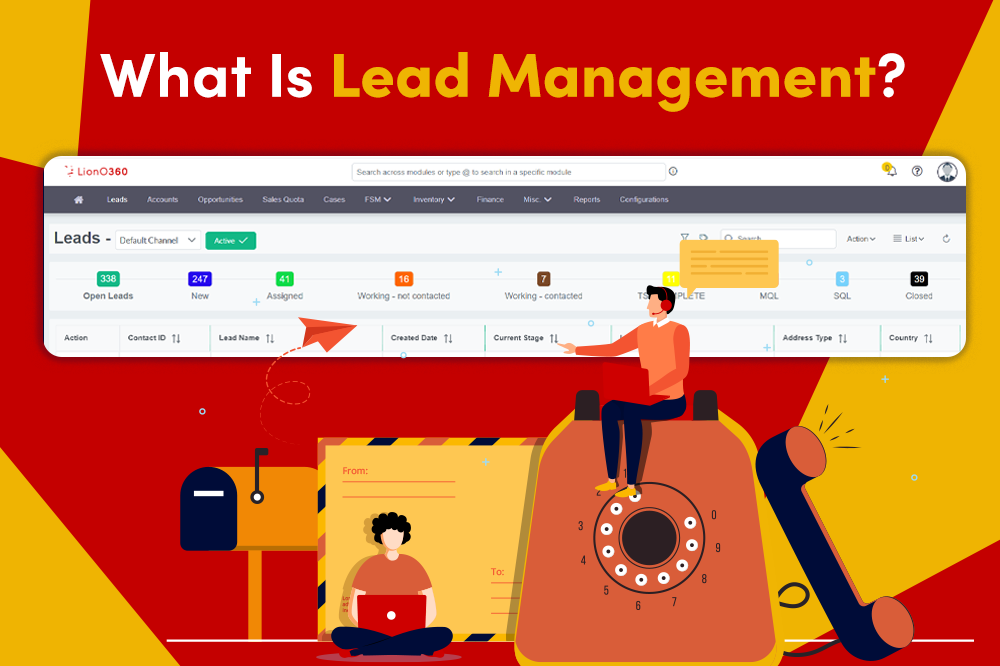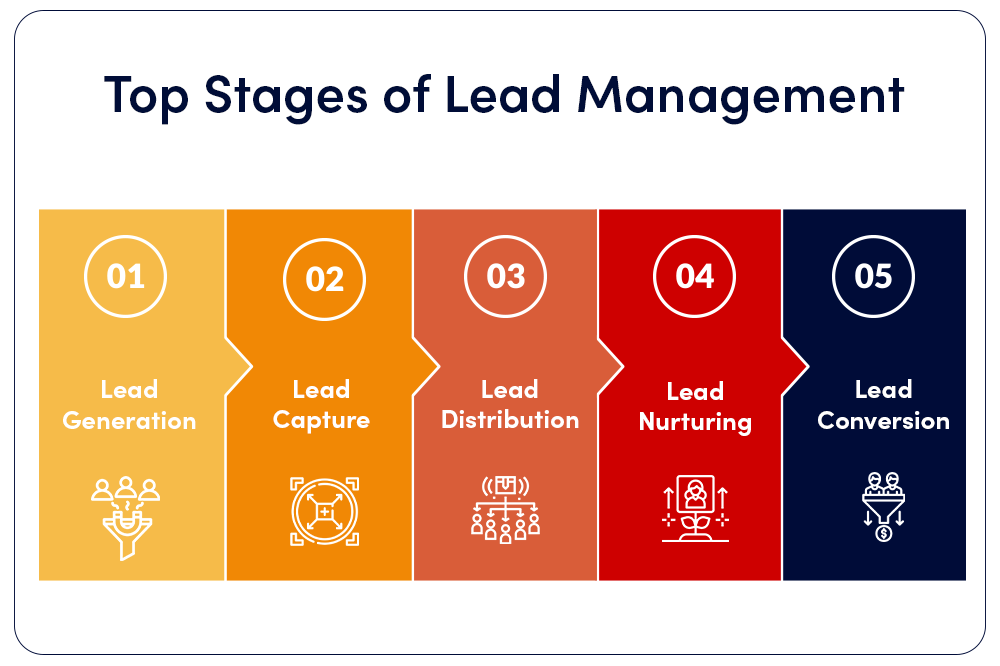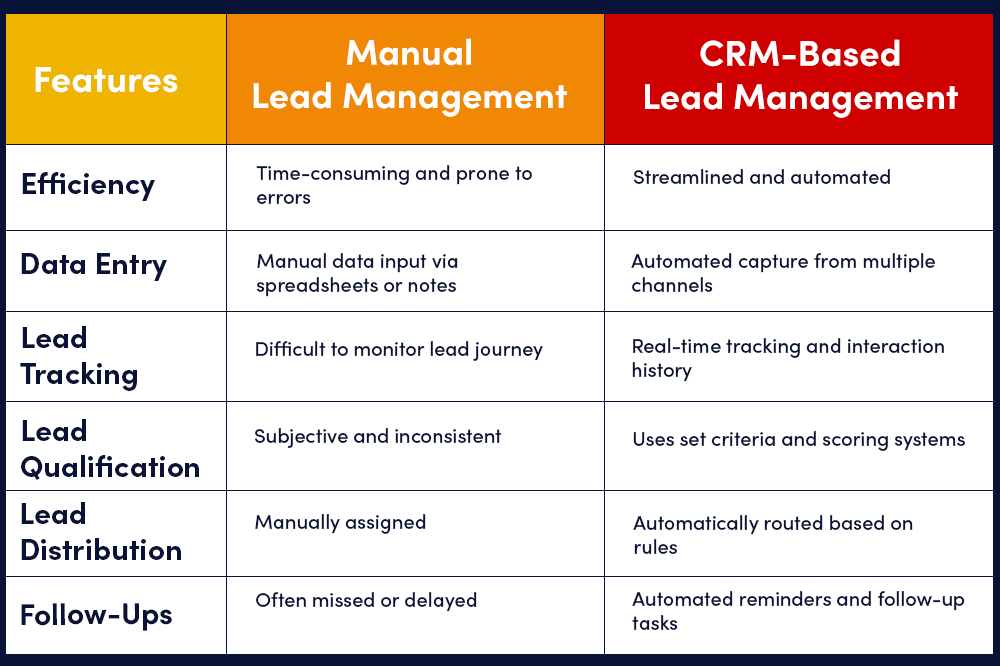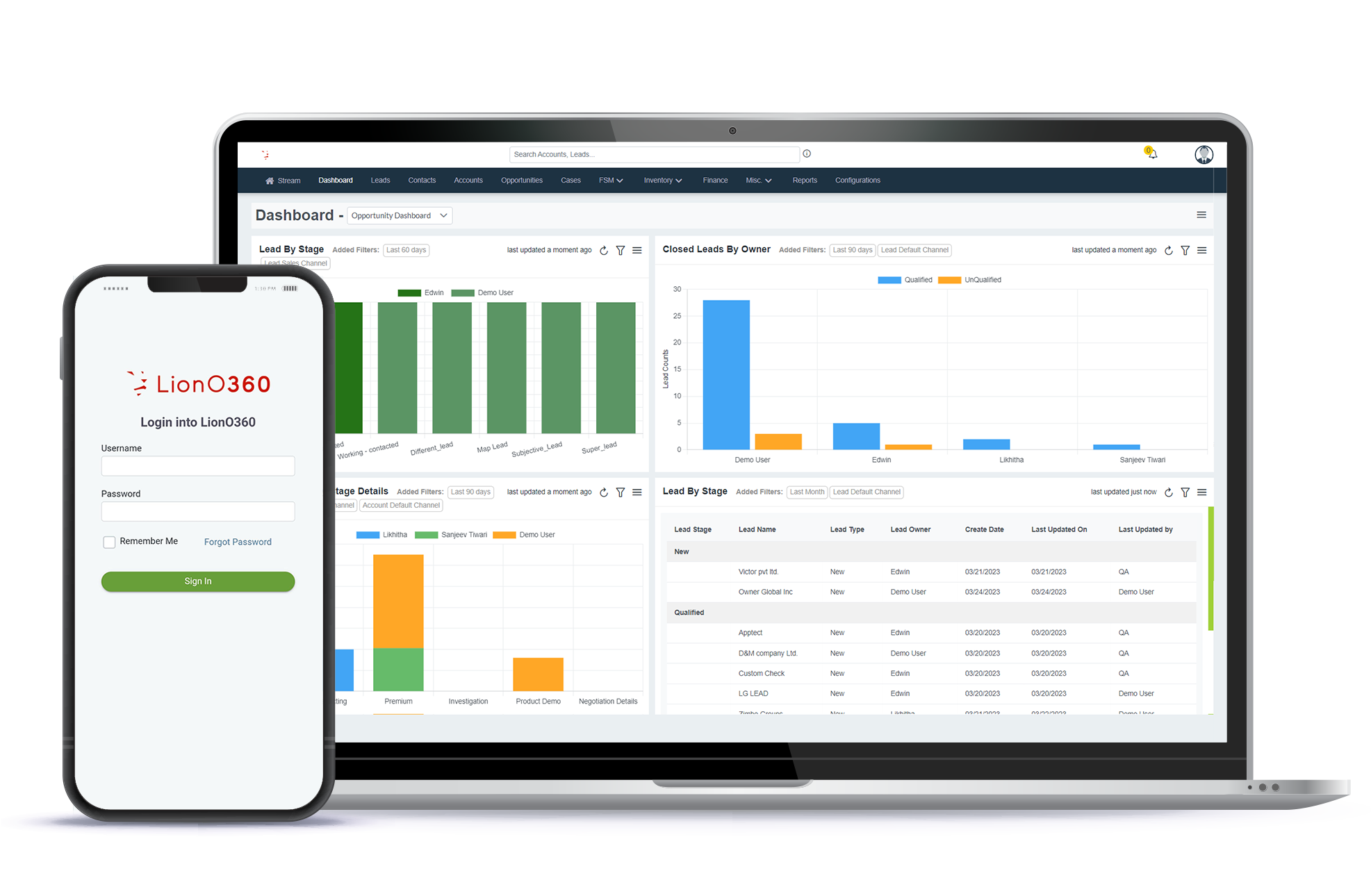
Effective lead management means turning more leads into sales. Today, many sales managers use CRM software to get the most out of new and existing leads. In fact, most B2B sales lead generation measure success by lead conversions. That doesn’t mean manual methods are wrong. Many small businesses still grow using spreadsheets and basic tools but as your business grows, managing more customer data becomes essential. This is where CRM lead management software can make a big difference. If you're looking to streamline your lead process as you scale, keep reading this blog and you will get all the solutions:
Understanding Lead Management
Lead management helps companies capture, track and nurture potential customers—leads—throughout the entire sales process from first awareness to final purchase. Lead management describes how leads are captured from various sources (e.g., websites, social media, events), organized, tracked, and prioritized in order to buy once the lead is defined as qualified. Before reaching out to a lead, it is essential to make a relevant, timely interaction that is appropriately relevant to the customer's journey all while building the chances of conversion and further nurturing the opportunity. Done correctly, following a lead management process supports quick, efficient sales follow-ups while building relationships with potential customers. By optimizing lead management processes accordingly, businesses can improve sales team productivity (making them feel empowered), reduce lead loss or lead leakage, and ultimately increase revenue.
Lead Management Process
Lead management refers to the systematic process of capturing, tracking, and nurturing potential customers (leads) through the sales funnel until they are ready to make a purchase. A strong lead management process ensures that no opportunity is lost, and every lead is given proper attention. Effective lead management not only increases conversion rates but also improves sales forecasting, customer experience, and marketing ROI. The typical stages include:

What Does Effective Lead Management Look Like?
You risk losing sales opportunities if you are unable to manage the increasing growth of your lead generation. This is due to organizational issues vs. sound strategy. The more information and data you collect, the more difficult it will become to manage it.
Having an outdated lead management system can result in the loss of lead information. It can also cause duplicate data entry and mismatched sales representatives. Not to mention lost follow-up appointments and dreadful response times. Here is how a great CRM system can help you solve these problems for your growing company.
You will want to align your sales and marketing efforts. Work to define what metrics verify the success of your sales process upfront. Map out the process and know when to hand off tasks between marketing and sales team members. Organize your leads in one place. You can import outside lists into a CRM or enter them manually. You can connect social media accounts to your CRM to collect leads automatically, too.
Regularly update and clean your data to ensure your lead database remains accurate and efficient. You don’t want outdated or unqualified leads cluttering up your system, nor should converted customers remain categorized as leads. Staying organized by maintaining clean data helps streamline your sales process. Establish a system to manage and prioritize your leads—such as using a scoring or color-coded method to assign leads to the appropriate representatives. Additionally, track your lead generation efforts using reports, dashboards, campaign metrics, CRM tools, and lead tracking systems. These insights are essential for understanding what works, identifying gaps, and continuously improving your sales process.
Do you think you need to develop a new sales management process? Then we have some great tips for you to do just that.
Why Does Lead Management Matter?
Lead Management is essential because it allows companies to carefully and efficiently convert leads from potential customers to actual customers. If leads are not managed properly, they risk getting lost, missed, delayed, or called at the wrong time and there will be many more missed opportunities. A proper lead management process will ensure that every lead is accounted for; every inquiry acquired, followed up with, and nurtured from the moment they arrive on the landscape until they purchase. Proper lead management also helps sales teams focus on qualified leads ready to convert as opposed to leads that are less engaged as well as saving them time and energy while doing so. Prospects appreciate quick responses and personalized communication; a proper lead management process ensures that prospects feel valued and develops trust in the company they are speaking with. Lead management builds marketing and sales team coordination and gives more transparency into where leads are coming from and what they need to do next. Everybody wants to feel appreciated and acknowledged, and a reasonable lead management process gives prospects that opportunity. Furthermore, with CRM tools, organizations can track lead sources, analyze metrics, and pan out conversion rate of lead conversion theories from real data to guide their future use. In sum, good lead management serves to sell, improve customer experience, and allow organizations to grow with less guess work and more confidence - not to have it wasted by bad lead management.
Develop Your Own Sales Management Process
Once you can formalize managing leads for your business, choosing the right CRM software becomes easier. You will soon find that you can easily automate specific steps of your process.
With 68% of B2B vendors believing that customer data management is the main driver behind business growth, you need a process in place.
You can gather data and insights that will point you towards making improvements to your processes. You'll be shown where your largest opportunities to improve efficiency are within your sales funnel.
Here are five steps to help you develop your own sales management process:
- 1. Document Your Lead Management Process
- 2. Work to Refine Your Process
- 3. Make This Your Lead Management Strategy for Everyone
- 4. Measure and Analyze Your Lead Management Performance
- 5. Adjust the Lead Management Process as Your Business Changes
We hope that you can develop your own sales management process if you don't have one already. We will help you with more information ahead about how CRM lead management technology can further assist you.
Manual vs CRM-Based Lead Management
While manual processes can work for small teams, they lack scalability and reliability. CRM systems offer a structured, data-driven approach that reduces lead leakage, accelerates sales, and empowers teams with actionable insights.

How Does a CRM Lead Management System Help You?
Any great CRM lead management system should perform several basic functions for your business. These essential functions for your business should include:
- Manage new leads from start to finish throughout the sales funnel
- Delegate leads and tasks to any salesperson on your team
- Prevent the loss of leads from any point within your sales funnel
- Advise members of your sales team that they missed a task
- Prompt sales team members to keep meetings and appointments
- Produce reports according to predetermined data sets
- Record information that can be used to help with sales conversations
- Help your sales representative identify pre-qualified leads
- Reduce response time for gathering information for new prospects
Let's take a further look at when you should invest in a CRM lead management system for your growing business.
When Should You Invest in a CRM Lead Management System?
The right CRM lead management software allows everyone on your sales and marketing team to work together. Your sales representatives and managers can communicate with sales prospects, view new leads, update files, create reports, and manage your sales pipeline from one dashboard.
This creates an organized yet adaptable location for any small to medium-sized business to automate its lead management efforts like a large competitor would.
Another remarkable aspect of a CRM lead management system is that you can track leads that have not yet become paying customers. In addition, you can organize every lead into a category according to your sales process. This allows you to know which part of the sales funnel your leads are currently in.
This will allow anyone on your sales team to follow up with a lead anywhere in the funnel and know precisely where to pick up the conversation. A new lead will appreciate you not wasting their time with information they already received.
An investment in lead management software will make it easier for your sales team to focus on what they do best communicating with future customers without facing embarrassing miscommunications.
How LionO360 CRM Handles Lead Management Efficiently?

LionO360 CRM is one of the best lead management software. It is designed with intelligent lead automation and a user-centric approach to simplify and supercharge lead management. Here’s how it stands out:
- Multi-Channel Lead Capture: Seamlessly collects leads from web forms, social media, emails, and third-party integrations—ensuring no lead is missed.
- Lead Scoring & Qualification: Automatically lead scores based on customizable criteria like behavior, demographics, and engagement levels—helping sales teams prioritize high potential prospects.
- Sales Pipeline Visibility: Offers a dynamic dashboard to visualize lead stages, deal values, and conversion probabilities—empowering data-driven decisions.
- Custom Workflows & Automation: Automates repetitive tasks like lead nurturing emails, status updates, and task assignments—saving time and ensuring consistency.
With LionOBytes, businesses can centralize their lead data, enhance team productivity, and optimize their entire sales funnel—leading to higher conversions and better customer relationships. Schedule your free CRM demo now to advance your lead management software.
Also Read:
Top AI-tools for Lead Management in 2025
Frequently Asked Questions
What is meant by lead management?
Lead management is a systematic process that helps businesses capture, track, and nurture potential customers throughout the sales journey. It involves organizing leads, prioritizing them based on their readiness to buy, and ensuring timely, relevant interactions to increase conversion chances.
Do I need a CRM system for lead management?
While manual methods using spreadsheets can work for small businesses, as your company grows, a CRM lead management system becomes essential. It helps automate processes, centralize data, and provide better insights, making it easier to manage increasing amounts of customer information efficiently.
How can lead management benefit my business?
Effective lead management can significantly improve your sales process by:
- Increasing conversion rates
- Enhancing sales team productivity
- Reducing lead loss or leakage
- Improving sales forecasting and customer experience
- Ultimately increasing revenue for your business
What features should I look for in a CRM lead management system?
A great CRM lead management system should:
- Manage leads throughout the sales funnel
- Delegate leads and tasks to team members
- Prevent lead loss
- Send reminders for missed tasks and appointments
- Generate reports
- Help identify pre-qualified leads
- Reduce response time for gathering prospect information







